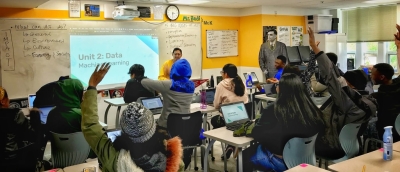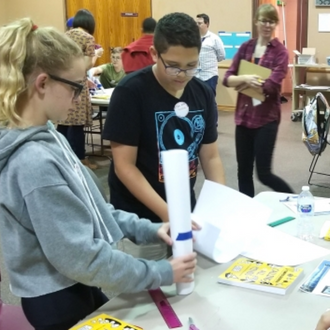Changing the Face of AI Through Youth Education

by Emily Reid, Vice President of Open Learning, AI4ALL
Artificial Intelligence (AI) has been called “the new electricity” and the driver of the fourth industrial revolution. Science fiction would have us believe that AI will take the form of an all-knowing robot, and studies show that real job displacement has and will occur as the result of AI’s expansion. AI is a topic of presidential debates, dinner table conversations and, for some, represents an existential threat.
But what is AI?
It is not surprising that it is hard for many to answer the question above. It is a subject about which many are very concerned, yet minimally informed.
Access to AI education has traditionally been confined to university ivory towers, understood only by those in advanced math and computer science departments.
In the United States, only 45% of high schools across the country offer computer science, never mind AI. Because AI education has traditionally only been available in advanced technical degree programs, which are often not very diverse, AI practitioners are not representative of the broader population. As one example, only 14% of AI researchers around the world are women of any race. In short, an understanding of AI and the practice of it has traditionally been available to very few.
Until now. At AI4ALL, we believe we can increase diversity and inclusion in AI by teaching young people about AI — and not just to understand it, or use it, but also to create it and influence it. In our programs, we present AI as a tool to solve problems students care about. AI4ALL’s Open Learning program is a free, project-based AI education program for high school students facilitated by community members. Our first course, ExploreAI, directly addresses the issue of access to quality AI education. ExploreAI has no prerequisites for the student, nor for the facilitator. No programming or math background is needed. Instead, ExploreAI gives students a rigorous conceptual introduction to AI through a project-based approach. ExploreAI is an approximately thirty-hour course with five units that cover:
- What AI is and what some of its societal implications are,
- Why data is so important in AI and machine learning,
- Privacy and algorithmic bias issues in AI,
- A diversity of role models in AI pursuing diverse career paths, and
- How AI connects to students’ current interests and their community.
Each unit includes a project where students can work with others and share their own perspectives on what they have learned. At AI4ALL, we believe that this is a great way for all students to learn, especially those who may not see themselves represented in the field of AI. When students can learn alongside peers (even alongside their teacher!), connect the field to issues they care about, and see themselves or their interests reflected in AI role models, students will not only better absorb the material but also will be able to more confidently identify as technologists. We see ExploreAI as the first step in a longer journey of learning about AI and influencing its development.
Libraries are uniquely positioned to play a role in changing the face of AI. AI is only as good as the data it learns from, and libraries are a treasured and long-standing source of reliable information.
Additionally, community-centered learning is central to our vision of building a new generation of AI leaders. The Urban Libraries Council’s fifty-year history of enriching communities and emphasis on digital inclusion also makes it central to making this change happen. This is a program that may be of interest to schools already in your network, who look to libraries for deeply enriching educational opportunities.
Open Learning launched officially in October 2019, with curriculum and support available for free online and in partnership with nine programs serving high school students across the country. One of our programs at Washington Leadership Academy, led by computer science teacher Jordan Budisantoso, exemplifies this approach.
One student said, “I liked that this [program] really taught us important information that showed us our future. Also, it gave us knowledge that many people or adults did not know so I felt like I was the first to get this information.” Another notes “I liked how there were so many job opportunities that were still connected to AI.”

At AI4ALL, we define AI as “a branch of computer science that allows computers to make predictions and decisions.” As humans learn how to delegate these decisions to AI and use AI predictions to solve problems, we also need to be thoughtful about who is influencing AI and how they are doing it. We have a vision of a new, large, diverse generation of AI technologists who are thinking about issues like algorithmic bias or how to use AI to address climate change from the very beginning — and it starts with student exploration.
If you are interested in bringing Open Learning to a school in your area, please check out our free curriculum and teacher guides at olp.ai-4-all.org. Open Learning Partners receive training, support, and exclusive resources from AI4ALL. If you are interested in becoming a partner, please fill out this form: http://bit.ly/OpenLearningPartners.

Emily Reid
Vice President of Open Learning, AI4ALL
Emily is a computer scientist, educator and entrepreneur. In her current role, Emily develops inclusive AI education programming for high school students. Before AI4ALL, Emily was the founding director of education at Girls Who Code, founder of a computer science education consultancy and a machine learning researcher and engineer.
Related Articles

Engaging Youth Through STEM Education
Pioneer Library System
Discover how libraries across North America have adapted their STEM offerings to keep youth learning, despite the new challenges of COVID-19.
Learn More

AI & Pandora: Restraining Evil, Liberating Hope
Roanoke County Public Library
Discover how Roanoke County Public Library was embracing artificial intelligence prior to the pandemic, and how the library quickly pivoted during closure to transfer programming online.
